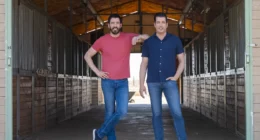A team of Queensland scientists are hard at work trying to change that, and they’re on their way to clinically trialing a blood test that could help save lives.
Those who study it, and those who’ve battled it call this illness the silent killer.

One Ovarian cancer patient said the cancer was growing inside her for up to seven years.
“Growing inside for that five to seven years while I’m riding my bike, while I’m going to work, while I’m gardening, doing strength training,” Karyn Stamp said.
By the time she was diagnosed last year her ovarian cancer had already advanced to stage 3.
The 58-year-old has since had major surgery and chemotherapy.
“I went through a whole process of wondering why my GP hadn’t picked it up, but then you realise that those symptoms could be symptoms of so many different things,” she said.
But there are hopes that a blood test developed here in Australia could sound the alarm for women well before they start feeling sick.
Researchers at the University of Queensland have been working on this project for the better part of a decade.
As it stands, the test is 94 per cent accurate.
Now the team is preparing for clinical trials.
The test picks up microscopic bubbles released by these cancer cells.
The goal here is to help doctors detect the disease in its earliest stages before it spreads from the ovaries.
This could give women less invasive treatment options and better survival rates.
If found early patients have a 90 per cent chance of being alive and well after 5 years.

”If you are able to identify early, you’re going to have a fighting chance for the women who suffer from this horrible disease,” Researcher Carlos Salamon said.
Scientists are hoping to get samples from 1500 women across the country over the next five years.
They’re working towards a future where annual screenings for those at risk is a possibility.
“Even though I know it doesn’t help me directly, anything that stops women having to go through what I’ve gone through and am going through would be incredible,” Karyn Stamp said.







